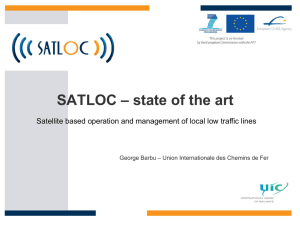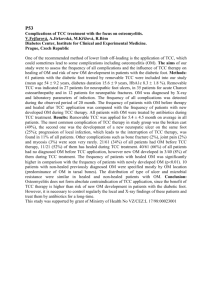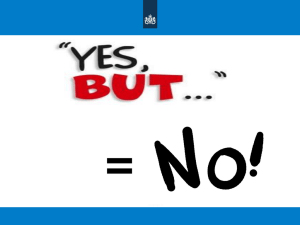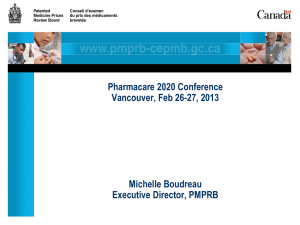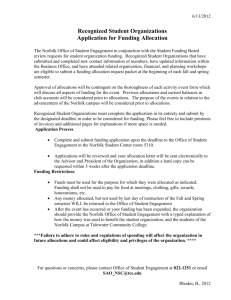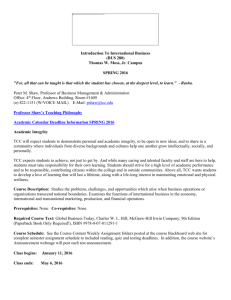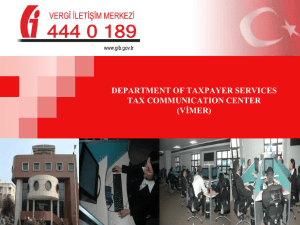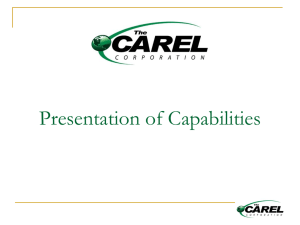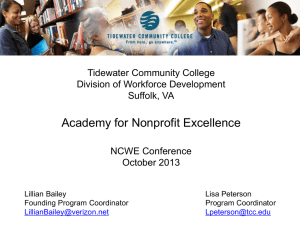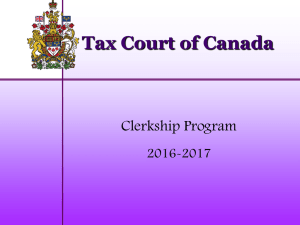Principles of Economics I - Faculty Websites
advertisement
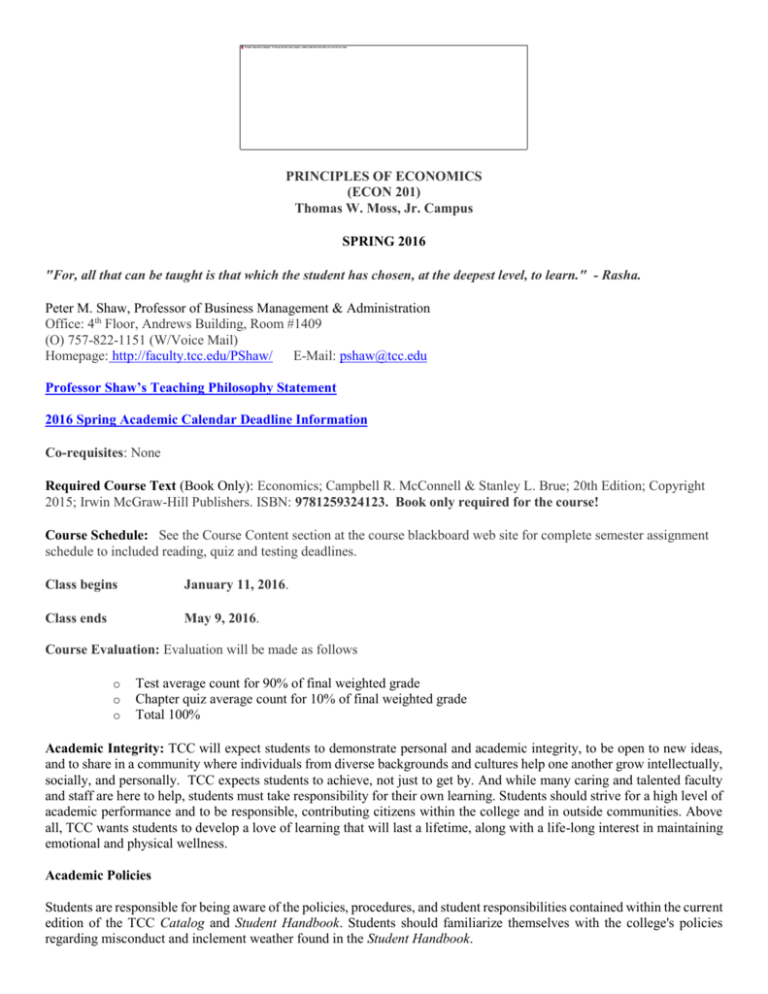
PRINCIPLES OF ECONOMICS (ECON 201) Thomas W. Moss, Jr. Campus SPRING 2016 "For, all that can be taught is that which the student has chosen, at the deepest level, to learn." - Rasha. Peter M. Shaw, Professor of Business Management & Administration Office: 4th Floor, Andrews Building, Room #1409 (O) 757-822-1151 (W/Voice Mail) Homepage: http://faculty.tcc.edu/PShaw/ E-Mail: pshaw@tcc.edu Professor Shaw’s Teaching Philosophy Statement 2016 Spring Academic Calendar Deadline Information Co-requisites: None Required Course Text (Book Only): Economics; Campbell R. McConnell & Stanley L. Brue; 20th Edition; Copyright 2015; Irwin McGraw-Hill Publishers. ISBN: 9781259324123. Book only required for the course! Course Schedule: See the Course Content section at the course blackboard web site for complete semester assignment schedule to included reading, quiz and testing deadlines. Class begins January 11, 2016. Class ends May 9, 2016. Course Evaluation: Evaluation will be made as follows o o o Test average count for 90% of final weighted grade Chapter quiz average count for 10% of final weighted grade Total 100% Academic Integrity: TCC will expect students to demonstrate personal and academic integrity, to be open to new ideas, and to share in a community where individuals from diverse backgrounds and cultures help one another grow intellectually, socially, and personally. TCC expects students to achieve, not just to get by. And while many caring and talented faculty and staff are here to help, students must take responsibility for their own learning. Students should strive for a high level of academic performance and to be responsible, contributing citizens within the college and in outside communities. Above all, TCC wants students to develop a love of learning that will last a lifetime, along with a life-long interest in maintaining emotional and physical wellness. Academic Policies Students are responsible for being aware of the policies, procedures, and student responsibilities contained within the current edition of the TCC Catalog and Student Handbook. Students should familiarize themselves with the college's policies regarding misconduct and inclement weather found in the Student Handbook. Due to a ruling by the US Office of Education’s Family Right’s and Privacy Office, Tidewater Community College cannot post a student’s final course grade by using the students social security number unless the student has given a signed waiver statement granting permission to use said number. Final grade reports are posted at the SIS web site at the end of each semester. Electronic Devices Policy: Students are expected to adhere to the TCC Student Handbook policies: Cell phones, pagers, and other communication devices are prohibited from use in classrooms, laboratories, and libraries, unless authorized by the appropriate faculty or staff. Although soundless communication devices such as cell phones and pagers are permissible in classrooms, college offices, and/or meeting rooms, they must not be answered during class. E-Mail Requirement: (1) Always include your name and course/section (for example, ECO 201 O01N) enrolled when sending me an e-mail, (2) DO NOT send me e-mail in "text messaging format" (using symbols or numbers for words) or I will not read the e-mail, and (3) the e-mail message is to be in simple English. Course Description: Introduces macroeconomics including the study of Keynesian, classical, and monetarist principles and theories, the study of national economic growth, inflation, recession, unemployment, financial markets, money and banking, the role of government spending and taxation, along with international trade and investments. Prerequisites: None Instructional Procedures: Feel free to ask questions if there is something you do not understand and feel free to disagree with classmates and the professor in the teaching situation if you feel you have a valid point to make. Remember to keep up and it will not be necessary to catch up! Please call me to schedule an appointment if you need to meet with me regarding course information. Teaching activities of this course include: o o o Lectures Discussions Assignments Learn how to read your lessons: o o o For quick ideas For depth and content And for review Finally, relax and engage this course learning experience and you should do very well. Course Chapters & Tests: Test 1 (chapters 1 - 4) Test 2 (chapters 24 - 27) Test 3 (chapters 28 - 31) Test 4 (chapters 32 - 34) Test 5 (chapters 36/37 select readings and chapter 38) Class Participation: Students are expected to complete reading assignments prior to class meetings. Participation is herein defined as class attendance and meaningful contributions to class discussions. Grading Scale: A 90 - 100 B 80 - 89 C 70 - 79 D 60 - 69 F 59 AND BELOW Failure to notify the professor prior to missing a test/exam may result in an "F" for that test/exam. Final grades are available to each student within the Student Information System (SIS) now web delivered via MyTCC or SIS. Based on the progression of the course, the grade distribution for each assignment may change. However, if changes are made, I will notify students in a timely manner and in writing. Measurable Learning Outcomes After the completion of this course, students will be able to: 1. Construct a graph to illustrate the relationship between two variables 2. Distinguish macroeconomics from microeconomics, and positive economics from normative economics 3. Demonstrate an understanding of the concept of scarcity as it applies to making economic decisions 4. List the categories of scarce resources and explain the nature of the economizing problem 5. Recall how economic growth and international trade increase consumption possibilities 6. Define comparative advantage, and demonstrate how specialization and trade add to a nation’s output 7. Describe and detail the mechanics of the circular flow model 8. Define and apply the principles of supply and demand as a rationing device which determines the market price of a product, service or resource 9. Differentiate between the public and private sectors and their components 10. Recall the nature and function of a price index, and describe the difference between nominal GDP and real GDP 11. Analyze key aspects of an economy including its size, growth rate, and labor market conditions 12. Differentiate between different phases of the business cycle and understand the consequences of their byproducts 13. Analyze how changes in equilibrium real GDP can occur in the aggregate expenditures model, and describe how those changes relate to the multiplier 14. Demonstrate an understanding of what determines the level of income, employment, output, prices and interest rates in the US Economy 15. Apply and demonstrate an understanding of monetary and fiscal policy, and the appropriate use of each to obtain three key economic goals: economic growth, full- employment and stable prices 16. Demonstrate competency in the concept of money creation through the banking system and loanable funds market 17. Illustrate how an economy’s equilibrium price level and real GDP are determined using the AD/AS model 18. Explain the advantages of specialization and trade in international economics Major Chapter Topics Covered in this course Chapter 1: Limits, Alternatives and Choices Chapter 2: The Market System and the Circular Flow Chapter 3: Demand, Supply and Market Equilibrium Chapter 4: Market Failures – Public Goods and Externalities Chapter 24: An Introduction to Macroeconomics Chapter 25: Measuring Domestic Output, National Income Chapter 26: Economic Growth Chapter 27: Business Cycles, Unemployment and Inflation Chapter 28: Basic Macroeconomic Relationships Chapter 29: The Aggregate Expenditure Model Chapter 30: Aggregate Demand and Aggregate Supply Chapter 31: Fiscal Policy, Deficits and Debt Chapter 32: Money, Banking and Financial Institutions Chapter 33: Money Creation Chapter 34: Interest Rates and Monetary Policy Select Readings Chapter 36 & 37: Extending the Analysis of Aggregate Supply/Current Issues in Macro Theory and Policy Chapter 38: International Trade Withdrawal Policy Students who wish to withdraw without academic penalty should contact a counselor to determine the appropriate procedure. Withdrawals through completion of 60 percent of a session will result in a W grade. After 60 percent of a session is completed, a withdrawal will result in a grade of F in a credit course or a grade of U in a developmental course, except under mitigating circumstances that must be documented by the instructor and approved by the academic dean. Dynamic session classes have unique refund and withdrawal dates. Contact a campus Enrollment Services Office for more information, or visit http://www.tcc.edu/students/calendar/academic/Dynamic.htm. A student who drops after the last day to withdraw does not receive a "W." He/she receives an "F," in which case there is both an academic and financial penalty. A student who withdraws by the deadline faces a financial penalty, but not an academic penalty. Academic Calendar Deadlines March 23 is the last day to withdraw without academic penalty http://www.tcc.edu/students/calendar/academic/ from a 16-week course (See Note) Note: Students who wish to withdraw without academic penalty should contact a counselor to determine the appropriate procedure and date. Withdrawals through completion of sixty percent of a session will result in a W grade. After sixty percent of a session is completed, a withdrawal will result in a grade of F in a credit course or a grade of U in a developmental course, except under mitigating circumstances that must be documented by the instructor and approved by the academic dean. Dynamic Session classes have unique refund and withdrawal dates. Please contact the Enrollment Services Office for procedures and dates. Blackboard and Course Communication If the TCC black board system goes off line, you can access the class course outline, audio lectures, power point slides, etc. at Professor Shaw’s "faculty web site" . However, the online chapter quizzes and tests can only be accessed from the course black board web site. If you have any questions, please contact Professor Shaw immediately. Please Note: I e-mail all course announcements via the "@email.vccs.edu" e-mail address. If you have not registered yourself to use this e-mail address, I would suggest you go to "MY TCC" to be registered. Course Policies 1. In Class Food Policy: My food policy during class time is that you can bring into the classroom a light refreshment like a cup of coffee, soda or bottled water accompanied by a small snack that does not permeate food odor and/or make noise that is annoying to your classmates. Bring in a full meal during class time is not allowed since this is a classroom not a cafeteria. You must remember that sometimes one or more of your classmates may have had to rush into class without the benefit of a meal before class time. Having someone eating a full meal (for example, a meal from fast food chain) that permeates food odor and/or noise can easily become distracting and/or annoying to the class. You may bring into the classroom and consume a full meal before class time or after class has adjourned. 2. Attendance Policy: Students are expected to attend all class sessions. They will be allowed to miss 10% of the total class sessions. Students accumulating more than 10% of the class sessions may be dropped from the class. Students are expected to be prepared and on time to class. Online students attendance will be monitored by there course web site activity. 3. Late Work/Make-up Exam Policy: It is the student’s responsibility to contact Professor Shaw regarding the makeup of any testing or project due for the course. Otherwise, student will receive a zero score for work not made up by timeline assigned by Professor Shaw 4. Statement on Classroom Behavior: TCC is committed to maintaining a social and physical environment conducive to carrying out its education mission. Therefore, all members of the TCC community are expected to demonstrate standards for civility. Be moderate in speaking. Loud, obscene, argumentative, or threatening speech is disruptive to teaching and learning and is offensive to others. It has no place in an academic setting. Resolve any disagreements in a positive, non-combative manner. Request the assistance of college authorities if needed. Show respect for the comfort of others in an educational setting by observing acceptable standards for personal cleanliness and dress. 5. Disposition of Classes for Emergency Shutdown of the College: To comply with Policy 2106 Disposition of Classes for Emergency Shutdown of the College, 4.4. All faculty will include the following statement, or a statement developed under 4.3.2., in their course syllabi to address how students will be graded and/or complete a course for a grade in the event of an extended emergency shutdown. In the event of an emergency shutdown of the college, the president and her executive staff may elect to conclude the term in session if eighty-five percent or more of that term has been completed. If the term in session is concluded, faculty shall compute final grades of students based on coursework completed at that point. Statement on Plagiarism and Academic Misconduct The paragraphs below come from the Student Handbook and are TCC’s policy on plagiarism and academic misconduct. Including the following statement verbatim: Academic misconduct includes, but is not limited to, the following actions: cheating on an examination or quiz—either giving or receiving information; copying information from another person for graded assignments; using unauthorized materials during tests; collaboration during examinations; buying, selling or stealing examinations; arranging a substitute for oneself during examinations; substituting for another person, or arranging such a substitution; plagiarism—the intentional or accidental presentation of another’s words or ideas; collusion with another person or persons in submitting work for credit in class or lab, unless such collaboration is approved in advance by the instructor. Faculty members who have reliable evidence of academic misconduct will (1) investigate the matter, and (2) review the facts of the matter and the proposed penalty with the appropriate academic dean. They may then take one or more of the following actions: Require the work to be accomplished again Give no credit for the test, paper, or exercise Assign a grade of F, U, or W for the course Refer the matter to the campus Dean for Student Services or designee for possible disciplinary sanction through the college’s disciplinary procedure If the faculty member chooses to refer the matter to the campus Dean for Student Services or designee for disposition, the Plenary Disciplinary Procedure shall be followed, and the student’s dismissal from the college is a possibility. Disability Services Students who have documented, diagnosed disabilities, and who need special accommodations for tests, etc., are advised to see the Disabilities Services staff in Student Services so that the instructor may be notified of what accommodations are appropriate in each case. Requests for accommodations should be made to the designated campus disability services counselor at least 45 days before classes begin. Documentation must be provided to support the need for accommodations. For assistance with disabilities, contact the campus Disabilities Counselor/Provider or the Coordinator of Learning Disabilities Services: call 822-1213, visit Student Services/Development, or visit the Disability Services webpage at http://www.tcc.edu/students/specialized/disabilityservices/index.htm Emergency Procedures In the event of a bomb threat, tornado, or fire, students and staff may be asked to evacuate the building or move to a secure location within the building. Evacuation routes for movement to an external location or to a shelter within the building are posted at the front of the room. Students should review the maps and make sure that the exit route and assembly location for the building are clearly understood. If assistance is required during an evacuation, please let the instructor know at the end of the first class. Tidewater Community College uses TCC Alerts to immediately contact and inform faculty, staff and students of a major crisis or emergency. TCC Alerts delivers important emergency alerts, notifications, and updates via: Email account (work, home, other) Cell phone Pager Smartphone/PDA (BlackBerry, Treo & other handhelds) When an incident or emergency occurs, authorized senders will be instantly notified via TCC Alerts. TCC Alerts is a personal connection to real-time updates, instructions on where to go, what to do, or what not to do, who to contact, and other important information. New users may also register by sending a text message to 411911keyword: TIDEWATER. Student Success Resources The following resources are available to TCC students. See the Student http://www.tcc.edu/forms/handbook/ for more information about student services and locations. Handbook or visit Learning Resource Centers Each campus houses a library and media resources in a Learning Resources Center (LRC). A separate slide and print library is located at the Visual Arts Center. The Learning Resources Centers contain research materials in both print and electronic format to support the courses, curricula, and mission of the college. Library materials include books, newspapers, magazines, journals and an extensive collection of indexes, abstracts and full text databases. Media resources include videotapes, audiotapes, films, CD-ROM/DVD, computer files, and other audiovisual materials. Visit this site for more information: www.tcc.edu/lrc/ Academic Support Services Each campus provides various kinds of academic assistance. One-on-one tutoring, math and computer labs, and other forms of individual and group assistance may be available. Students can also find free help for writing, from short questions about commas and comma splices to a comprehensive review of research papers in progress, in the Writing Centers. Online Help Desk Visit the following Distance Learning Resources for Students website for information about computer skills, technical support, library services for online students, and much more: http://www.tcc.edu/students/dtls/ Important Websites College Website: www.tcc.edu Blackboard and Student E-mail: https://tcc.my.vccs.edu/jsp/home.jsp Student Handbook: http://www.tcc.edu/forms/handbook/ TCC Catalog: http://www.tcc.edu/forms/catalog/ Class Schedule: http://www.tcc.edu/schedule/ (or log-in to SIS for current course offerings) Academic Calendar: http://www.tcc.edu/students/calendar/academic/index.htm Distance Learning Resources: http://www.tcc.edu/students/dtls/
